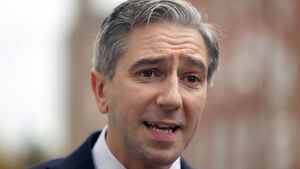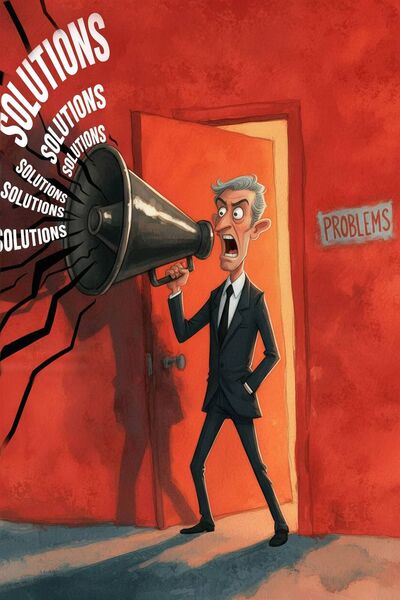Harris' posturing is the worst kind of politics

Into this incendiary moment, Harris decided to discuss migration levels with all the delicacy of a man testing a smoke alarm with a blowtorch. Picture: Leah Farrell/© RollingNews.ie
There's a particular species of politician who discovers a problem only when it threatens to jeopardise their career. They wake up one morning, check the polls, and suddenly the blindfold falls away. Simon Harris appears to have had such an epiphany last week, declaring with all the conviction of a recent convert that Ireland's migration numbers are "too high". One almost expects him to add: "And I've only been in Cabinet since 2016, so how was I to know?"
The Tánaiste's sudden road-to-Damascus moment on immigration would be funnier if it weren't so transparently cynical. A gobsmacked electorate are now witnessing the leader of Fine Gael, who has been warming various ministerial seats for the better part of a decade, suddenly speaking as if he's just returned from an extended sabbatical to discover Ireland has become unrecognisable. The chutzpah is almost admirable. Almost.
What Harris actually said, in fairness, wasn't entirely unreasonable on its face. He admits with sanguine poise that migration numbers are too high, deportation orders are not being enforced, and the system is creaking under pressure. These aren't exactly fringe observations. Matt Carthy from Sinn Féin has been banging this particular drum for years. The Irish Refugee Council has highlighted systemic failures. The difference is they weren't sitting at the Cabinet table while it all unravelled.
But timing, as they say in comedy and arson, is everything. Harris chose to harden his rhetoric in the immediate aftermath of riots at Citywest and just days before someone decided to set fire to an IPAS centre in Drogheda filled with sleeping families. Nick Henderson, head of the Irish Refugee Council, labelled Harris' comments as careless, an understatement you might use to describe someone juggling petrol cans at a bonfire.
Henderson's choice of the phrase "crossing of the Rubicon" for the Drogheda attack wasn't accidental. Until that terrifying night, the previous attacks had targeted empty buildings, future accommodations, and threats made against the abstract. This was different. These were people made homeless, five rescued from flames, and a baby carried from the top floor. Someone watched that building burn with people inside and thought, 'Yes, this will do'.
Into this incendiary moment, Harris decided to discuss migration levels with all the delicacy of a man testing a smoke alarm with a blowtorch. When opposition politicians like Gary Gannon suggested he was channelling Nigel Farage and Labour's Aodhán Ó Ríordáin called his comments "disgraceful", Harris did what politicians do when they've stepped in it: he doubled down. The left, he declared, tries to "shut down" the debate on immigration.
This is the oldest trick in the populist playbook - position yourself as the brave truth-teller being silenced by politically correct forces. Never mind that as Tánaiste, you're literally the second most powerful person in government. Never mind that you command media attention with a click of your fingers. You're being "shut down" while speaking to the equivalent of a sold-out arena.
The newly cherished statistics Harris wielded - that 80% rejection rate for asylum applications - is meant to be a gotcha moment. Look, he's saying, most of these people don't even qualify. But flip that around: it means the system is working, doesn't it? Applications are being processed, and rejected cases are being identified. Bravo!
But the problem isn't the statistics. It's what happens next. And what happens next has been the government's responsibility for nearly a decade.

Taoiseach Micheál Martin excelled at the role of supportive understudy, chiming in to call these rejected applicants "false claimants" and "economic migrants", using language that would have been unthinkable two years ago. He even mused about offshore deportation hubs outside the EU. It seems the Irish political establishment has been taking notes from Britain's Rwanda scheme because nothing says "we've learned from others' mistakes" quite like copying their most grotesque policy failures.
The thing about political volte-faces is that they're rarely actually sudden. They're the culmination of focus groups, polling data, and constituency clinics where people have started asking uncomfortable questions. Harris didn't wake up last Tuesday week and suddenly notice migration patterns. He noticed his party's poll numbers. He noticed independents eating Fine Gael's lunch in suburban constituencies.
What's particularly galling is the sheer abdication of responsibility. Harris has been in Cabinet since 2016. That's nine years. Nine years during which the international protection system became what it is. Eight years during which deportation orders weren't tracked or enforced. Eight years during which, as Carthy pointed out, the government "admitted they simply do not know if those with deportation orders have left or not." This isn't something that happened to the government; this is something the government did, through action and inaction in roughly equal measure.
Harris can't be allowed have it both ways - to be both architect and critic, insider and outsider. He wants credit for acknowledging problems without accepting blame for creating them. It's like an arsonist turning up to critique the fire brigade's response time.
There's also something politically expedient about demanding rent from asylum seekers in the IPAS system who are fortunate enough to find work, which Harris deemed "common sense". It is reasonable to expect people working to contribute, but this is fiddling with small change while the annual expenses soar into eye-watering millions. It's performative toughness designed to signal to voters that you're doing something, anything, even if it's largely irrelevant to the actual systemic failures you've engineered with indifference.
The EU Migration and Asylum Pact makes a cameo appearance in this drama, with Carthy arguing that it'll make things worse for Ireland, given our unique position in the Common Travel Area with Britain. Whether he's right is almost beside the point, the government is signing up to it anyway, because being seen to do something European and official-looking is more important than whether it'll actually work.
What we are witnessing isn't a timely debate about immigration policy but a sneak preview of the issues that will likely dominate the next election landscape. Harris and Martin have doubtless realised, post the volume of spoiled votes in the Presidential election, that migration will be their electoral nemesis. So instead of defending their joint record, they're going to outflank critics. It's pre-emptive capitulation dressed up as brave, suit-and-tie truth-telling.
The tragedy for Ireland is that there is a legitimate and urgent conversation to be had about migration, integration, service capacity, enforcement and financial mismanagement on an epic scale. But you can't have that conversation in good faith while standing in front of the smouldering ruins of your own policy failures and pretending you're an outside observer. You can't demand "accurate figures and statistics", as Henderson puts it, while you're the one who's been compiling them for the best part of a decade.
And you certainly can't have it quickly enough in the shadow of an IPAS centre ablaze with people inside. Words have consequences. Rhetoric has weight. When political leaders suddenly talk about numbers being "too high" and systems being "overwhelmed", when they spout phrases like "false claimants" and suggest people don't "qualify", they're not having an academic debate. They're creating an atmosphere, setting a tone, giving permission.
None of this implies Harris personally lit that match in Drogheda but language is kindling, and politics provides the spark. When you spend years mismanaging a system and then suddenly declare it a crisis, while positioning yourself as the solution rather than the problem, you shouldn't be surprised when someone else decides to take more direct action.
The real volte-face here isn't about policy but concerns political honesty, if we can still believe such a concept still exists. After years of failing to grasp this issue, Harris has decided the answer is to posture like someone who has just noticed the issue, while blithely demanding everyone else shut up and listen. It's shameless opportunism masquerading as political courage, and it's the kind of verbal posturing that emboldens spineless fire-starters.
Ireland deserves better than politicians who discover principles they have previously scorned when the subject becomes electorally convenient, feigning faux courage when it's politically expedient. But that would require taking actual responsibility, and Simon Harris has made it abundantly clear he's not in the habit of doing that.




